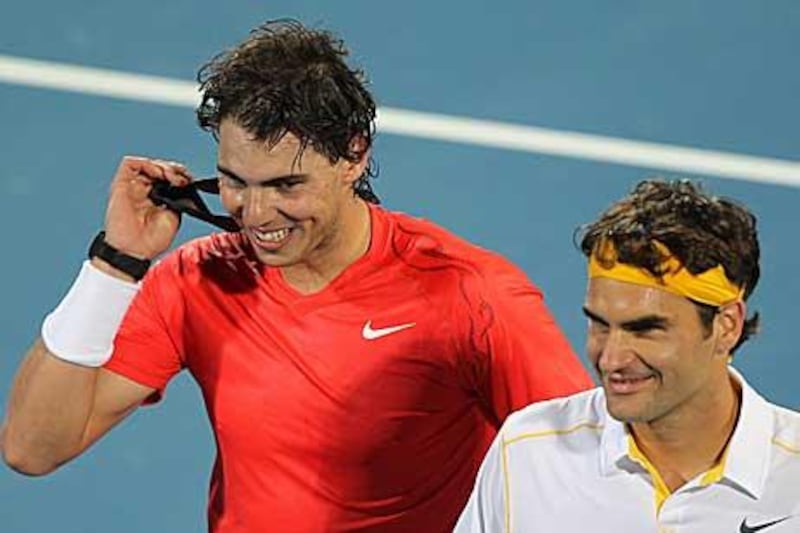People are strange, as you might have heard. You just do not expect to glean compelling evidence from a virtuous tennis rivalry.
Yet as Roger Federer and Rafael Nadal finish their start of 2011, as they move now from their Abu Dhabi exhibition toward Australia and heights beyond, the statistics do yell enough to transcend.
Upon a planet with three billion-plus men, a mere two have hoarded 10 of the last 11 grand slam titles, a staggering 21 of the last 23 and, all told, 25 of the last 30. So I guess it follows that they could surpass tennis to reflect broader human truths.
I suppose that, sure, two icons with unfathomable games could double as prisms for the notion that people are strange.
Now, along the path to how Federer and Nadal unwittingly show that people are strange, ask this: if you were organising a global sport, and you wished to make it appealing, and then you wished to generate vicarious fondness between spectators and participants, could you dare even hope for two ambassadors of such quality?
The accurate answer: no.
These guys have coursed through the recent years with first-rate art and first-rate decency. With each a threat to the other's cherished goals, they have kept the fussiness to very occasional flickers buried in press conferences.
Each has epitomised will, with Federer getting insufficient credit therein; his massive will seems to sweat less than Nadal's. They - especially Nadal - have made considerate gestures toward one another. They have given a highbrow rendition of mutual respect.
In the process, they have managed to stage one of the most sterling sporting occasions ever, the 6-4, 6-4, 6-7 (5), 6-7 (8), 9-7 Wimbledon final of 2008. One of them won that match. The other lost. I do know which did which, but after sitting there all afternoon and evening, it no longer seemed paramount.
In a fine twist, the guy who technically "lost" soon reported a steady outpouring of encouragement from the public across ensuing months, as if all his imperial winning needed a "loss" to sprinkle in some humanising.
So on one side you have Federer, the 29-year-old Swiss from the cross-cultural corner Basle who takes seriously his position as ambassador.
In country after country, he patiently answers questions in three languages, again and again and again. He has that regal carriage that flatters the sport. You get a sense he could be not just a tennis ambassador but an ambassador-ambassador.
As a bonus, he happens to be the most accomplished player ever, with 16 major titles, and he happens to have treated audiences to some of the loveliest sights in life, those of balls leaving his racket and doing things unimaginable.
On the other side you have Nadal, the 24-year-old Spaniard from the sunny and gracious island of Mallorca, who takes seriously his position as a considerate person. His bullheaded approach to the game makes a curious contrast with his gentility once the game has concluded.
As a bonus, he might yet become the most accomplished player ever by adding to his nine major titles, and he happens to have treated audiences to some newfound tier of human effort.
You would think disliking either guy would require unnatural straining, but then, you would underestimate the strangeness of people.
So say you chronicled them often for a newspaper between 2006 and 2009, and that newspaper would publish your little e-mail address, and that e-mail address would send you burrowing into the ever-haunting domain of public opinion.
Thus would you learn that plenty of people out there - not a majority, but plenty - adore either Federer or Nadal with such ferocity that the other is basically the cause all human misery. Their human glitches - and, sure, there have been those - become sweeping faults. The sweeping faults become unquestionable sinister-hood.
Maybe it is the rare intimacy of tennis, but they sound as if you have besmirched their family when they extract from beneath 22 paragraphs of compliments any perceived slight of their man from paragraph 23 - and then hold that up for ire.
My favourite came after that Wimbledon 2008, when given Nadal's possession of both French and Wimbledon titles, I accused the tennis computers of malfeasance with their continued placement of Nadal at No 2. My vast sins, according to a Federer connoisseur, included being "mean-spirited". She proceeded to brand Nadal as all but possessing horns, and excoriated likeable Novak Djokovic while at it.
I replied that labelling somebody the No 2 tennis player out of 6.8 billion did not seem mean to me, whereupon I began mulling the strangeness of people, and to reckon that in other ways I guess I must be strange, too.





